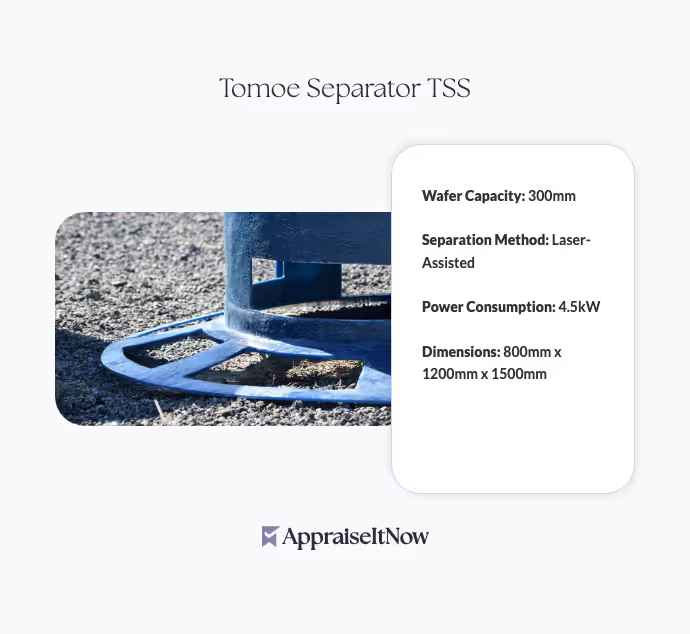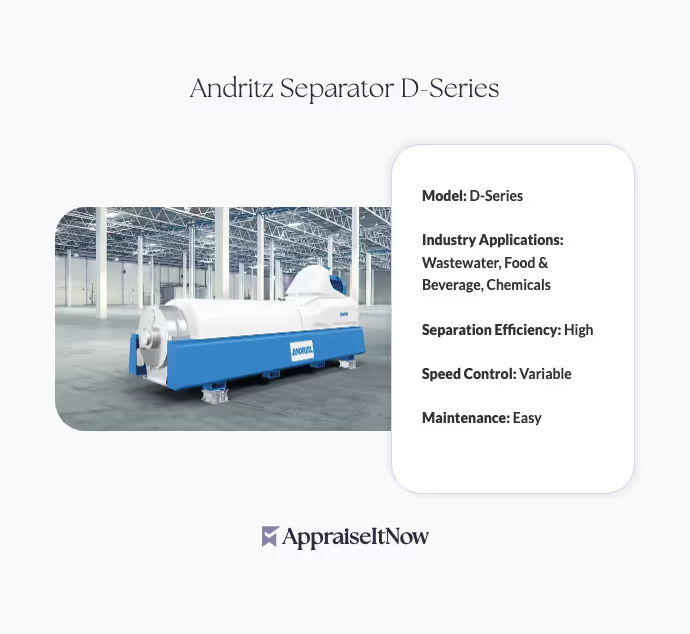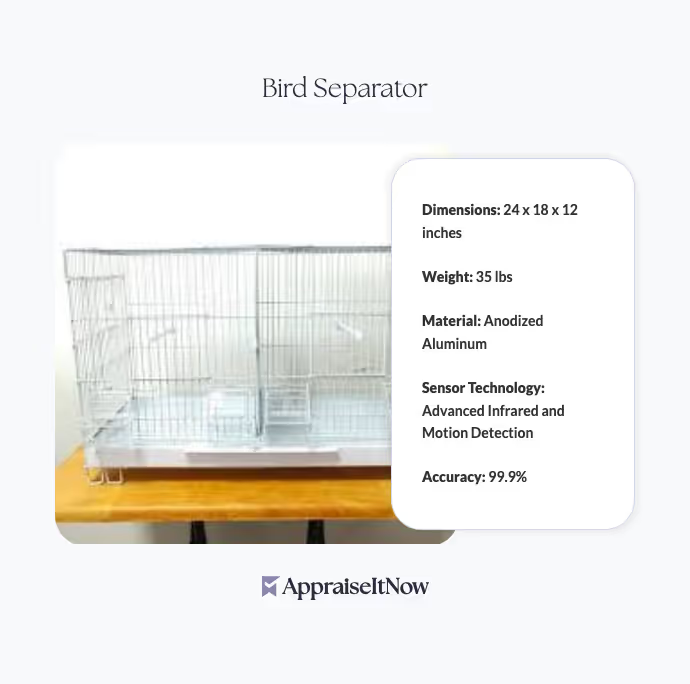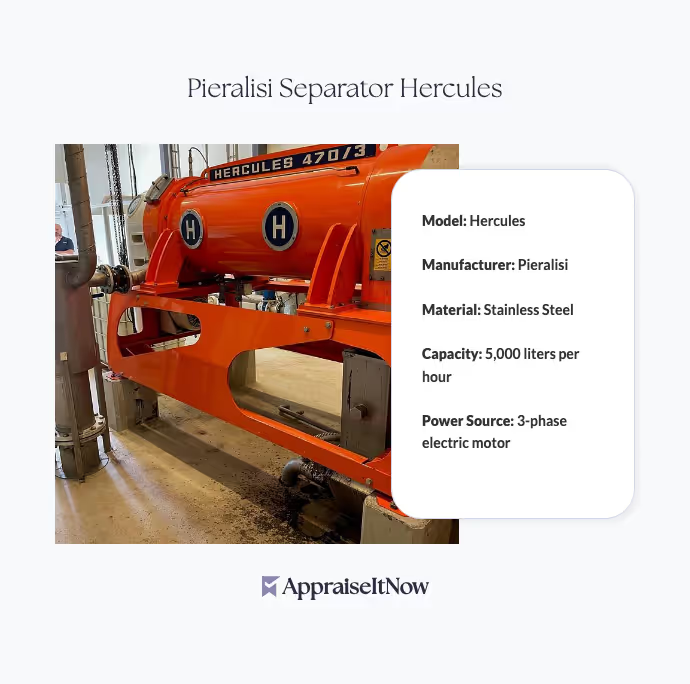<h1>How to Get Your Westfalia Separator MSA Appraised</h1>
<p>The Westfalia Separator MSA represents a critical industrial asset found in food and beverage processing, pharmaceuticals, and other precision manufacturing environments. Understanding how to properly appraise this specialized equipment ensures you capture accurate valuations whether you're buying, selling, or establishing insurance coverage. With current market estimates ranging from <strong>$100,000 to $150,000</strong>, getting the right appraisal makes a meaningful financial difference.</p>
<h2>Understanding Your Westfalia Separator MSA's Market Position</h2>
<p>Your MSA model occupies a unique position in the industrial equipment market. First introduced in 1960, this advanced separator was engineered for precision separation of liquids, gases, and solids across demanding applications. Only <strong>500 units were produced worldwide</strong>, creating a specialized market where documented condition, maintenance history, and operational specs directly influence value.</p>
<p>The Westfalia MSA's robust stainless steel construction and state-of-the-art control systems make it a sought-after asset in used <a href="/blog/an-introduction-to-appraising-construction-and-industrial-equipment">industrial equipment appraisal</a> markets. Its reputation for reliable, continuous operation across food processing, brewery operations, and pharmaceutical production translates to strong resale demand among businesses requiring advanced separation capabilities.</p>
<div class="callout tip"><p><strong>Market Insight</strong></p>
<p>Westfalia separators with documented service logs and OEM maintenance records typically command 15-20% premiums over comparable units with incomplete histories.</p></div>
<h2>Key Documentation Requirements for Accurate Valuation</h2>
<p>Professional appraisers evaluating your Westfalia Separator MSA need specific documentation to establish accurate market value. The question of what documentation matters comes down to authenticity, operational history, and technical specifications. Start by gathering your unit's <strong>serial number</strong>, <strong>manufacturing date</strong>, and <strong>production specifications</strong> — these form the foundation of any credible appraisal.</p>
<p>Beyond basic identification, comprehensive service logs prove invaluable. Maintenance records demonstrating regular professional servicing, any retrofit upgrades, or component replacements help appraisers understand how well the unit was maintained. Original equipment manufacturer (OEM) data sheets, operational manuals, and any certification documents (such as CE or ATEX compliance marks) significantly strengthen your appraisal documentation.</p>
<p>Understanding whether your separator operates as a <strong>2-phase or 3-phase unit</strong> matters substantially for valuation. Two-phase separators handle liquid-solid separation, while three-phase separators simultaneously process liquids, solids, and gases. This distinction affects which industrial applications your equipment can serve, directly impacting market demand and comparable sales analysis. Your unit's technical classification, along with specifications like <strong>liquid/solid (LD) ratio</strong> and residence time capabilities, become critical variables that professional appraisers use to identify comparable equipment in the marketplace.</p>
<h2>Assessing Physical Condition and Operational Status</h2>
<p>Professional <a href="/blog/food-processing-equipment-appraisal-what-you-need-to-know">food processing equipment appraisals</a> rely heavily on physical inspection to determine current market value. Appraisers examine whether your Westfalia MSA shows signs of wear consistent with its age and usage, evaluates the integrity of stainless steel components (critical for food industry compliance), and verifies that control systems function properly. Corrosion, bearing wear, and seal condition represent important factors affecting both immediate usability and long-term operational reliability.</p>
<p>An often-overlooked consideration involves recognizing when a separator requires overhaul versus routine maintenance. Identifying warning signs—such as unusual vibration, changes in separation efficiency, leakage, or abnormal noise patterns—helps appraisers establish whether your unit needs immediate service. These factors influence whether an appraisal reflects the equipment's as-is condition or requires adjustments for anticipated repairs.</p>
<div class="callout note"><p><strong>Condition Matters</strong></p>
<p>Units requiring minimal maintenance typically achieve valuations at the higher end of the $100,000-$150,000 range, while those needing significant overhauls may appraise at 30-40% discounts.</p></div>
<h2>Valuation Methods Used for Industrial Separators</h2>
<p>Professional appraisers employ multiple approaches when determining Westfalia MSA value. The <strong>sales comparison method</strong> analyzes recent transactions of similar separators to establish market-based valuations—though with only 500 units produced globally, finding exact comparables proves challenging. Appraisers adapt this approach by identifying functionally equivalent separators from other manufacturers and adjusting values for brand reputation, capacity differences, and technological variations.</p>
<p>The <strong>cost approach</strong> calculates replacement value using current manufacturing costs, which provides a useful ceiling for valuation but rarely reflects used equipment reality. The <strong>income approach</strong> applies to operations where the separator directly generates revenue—particularly relevant for food processing businesses where separation efficiency directly impacts production yield and product quality. Understanding which valuation method your specific situation requires influences the appraisal scope and final value conclusion.</p>
<p>For accurate <a href="/blog/everything-you-need-to-know-about-beverage-equipment-appraisals">beverage equipment appraisals</a>, appraisers consider how your separator performs in specific applications like dairy processing, brewery operations, or winery production. Application-specific demand, regulatory compliance requirements, and industry-specific performance standards all factor into the valuation process.</p>
<h2>Accessories, Certifications, and Resale Value Impact</h2>
<p>Your Westfalia Separator MSA's total value extends beyond the core equipment to include accessories, spare parts, certifications, and warranty coverage. Professional appraisers assess whether your unit includes original accessories, evaluate the availability and cost of replacement parts (a critical factor since specialized separators often depend on OEM components), and verify any certifications that impact regulatory compliance or market acceptability.</p>
<p>Certifications like <strong>CE marking</strong> (European safety compliance) or <strong>ATEX certification</strong> (hazardous area compliance) often command value premiums in certain markets, particularly in Europe. Conversely, lack of required certifications may restrict resale to specific geographic regions or require expensive retrofits, reducing market demand. Existing warranties or service contracts with the equipment also contribute positively to valuation, as they reduce buyer risk and maintenance uncertainty.</p>
<p>Retrofit or upgrade options available for your MSA model—such as enhanced automation, improved control systems, or efficiency upgrades—represent both opportunities and complications for valuation. While upgrades can increase utility and market appeal, they may also complicate finding direct comparables. Appraisers assess whether modifications enhance value, are neutral, or potentially detract by reducing originality or creating compatibility concerns.</p>
<h2>Market Demand and Resale Timeline Considerations</h2>
<p>The used Westfalia separator market operates differently than consumer equipment, with specialized buyers including food processing facilities, pharmaceutical manufacturers, and beverage producers actively seeking reliable separation equipment. Market demand varies regionally—strong demand exists in areas with concentrated food and beverage production, while markets with limited industrial activity may experience longer resale timelines.</p>
<p>Understanding typical resale timelines helps establish realistic expectations. Quality units with documented maintenance histories and complete accessories typically sell within <strong>3-6 months</strong> when properly marketed to industry buyers. Units requiring reconditioning or lacking documentation may require 6-12 months or longer to find appropriate buyers. These timelines influence whether an appraisal reflects a liquidation scenario requiring rapid sale, a normal market transaction timeframe, or a strategic positioning scenario allowing time for premium buyers.</p>
<div class="callout tip"><p><strong>Market Reality</strong></p>
<p>Westfalia separators with successfully documented beverage industry service records often attract premium-paying buyers willing to pay within the higher valuation range.</p></div>
<h2>Working with Qualified Appraisers</h2>
<p>Obtaining an accurate Westfalia Separator MSA appraisal requires expertise in industrial equipment valuation combined with specific knowledge of separation technology. Professional appraisers should possess credentials in <a href="/types/equipment-and-machinery">equipment and machinery appraisal</a>, familiarity with food processing and beverage industry standards, and experience with comparative equipment analysis.</p>
<p>AppraiseItNow connects you with credentialed experts holding qualifications from recognized organizations including <strong>AAA, ISA, ASA, CAGA, and AMEA</strong> who specialize in industrial equipment valuations. These professionals provide USPAP-compliant appraisals suitable for insurance, sale documentation, financing, or legal proceedings. The appraisal process typically involves detailed inspection, documentation review, market research, and a comprehensive written report establishing your equipment's fair market value based on current industry conditions and comparable sales data.</p>
<p>Whether your situation involves <a href="/types/business-assets">business asset valuation</a> for financial reporting, insurance coverage documentation, or preparation for equipment sales, professional appraisers bring the specialized knowledge necessary to accurately capture your Westfalia Separator MSA's true market value. For comprehensive guidance on choosing the right appraisal partner, explore our resources on <a href="/blog/what-to-consider-when-choosing-an-appraisal-company-for-equipment-and-machinery-valuation">selecting equipment appraisal companies</a> to ensure you receive expert valuation and documentation meeting your specific needs.</p>
<div class="callout note"><p><strong>Key Takeaway</strong></p>
<p>A certified professional appraisal of your Westfalia Separator MSA provides accurate market valuation ($100,000-$150,000 range), establishes proper documentation for insurance or sale purposes, and gives you confidence in major financial decisions regarding this valuable industrial asset.</p></div>
















